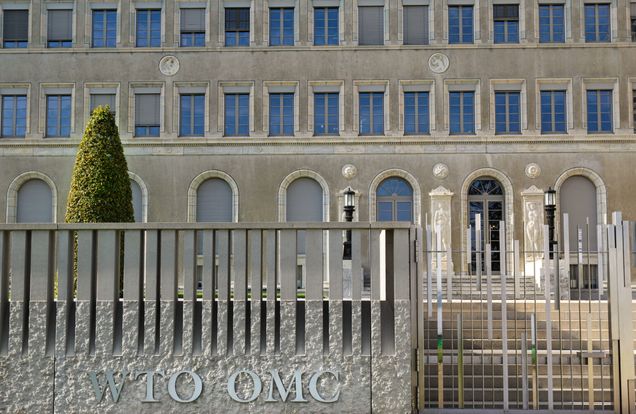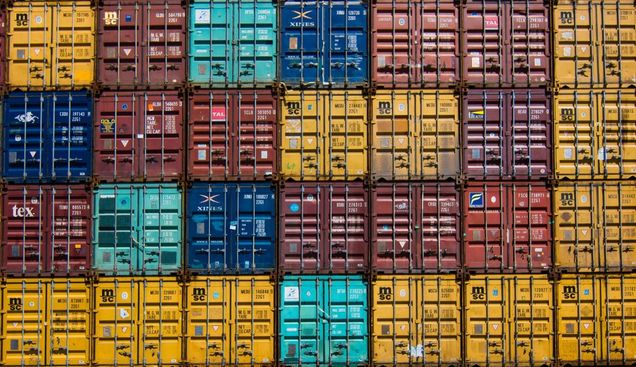GDP Center Round-up: 13th World Trade Organization Ministerial Conference, Abu Dhabi

From February 26-29 in Abu Dhabi, United Arab Emirates, member states of the World Trade Organization (WTO) will meet for the 13th Ministerial Conference (MC13). Like many international institutions, the WTO faces the challenge of meeting its original mandate amid multiple global crises, and MC13 presents a vital opportunity for trade ministers to potentially course correct.
Among hot button issues to be discussed is extending the much-embattled Waiver to the Agreement on Trade-Related Aspects of Intellectual Property Rights (TRIPS) to COVID-19 diagnostics and therapeutics in addition to vaccines. The WTO has also turned its attention to addressing obstacles that climate change poses to the global trade regime. The decisions that do, or do not, result from MC13 will shape the direction and relevance of the institution for years to come.
Recent research from the Boston University Global Development Policy Center (GDP Center) reveals a through line connecting our significant body of work on access to medicines with newer research on the emerging issue of trade and climate: intellectual property (IP) policies can potentially stymie low- and middle-income countries’ (LMICs) access to critical technology during crisis.
There are certain trade rules that countries seem quick to ignore in the interest of domestic policy priorities. These often include WTO rules that constrains countries in introducing new trade barriers or deploying discriminatory industrial policy. Yet, research in both the access to medicines and the trade and climate spaces reveals that, while countries were willing to eschew certain trade rules in favor of domestic policies responding to COVID-19 and climate change, respectively, this notably did not include changes to domestic IP policies.
Why might countries be reluctant to take IP policy action when they are ready to eschew other global rules in favor of domestic action on health or climate? Might IP also present an obstacle to access in the context of climate technology?
Lessons from access to medicines could possibly be applied to ongoing debates within trade and climate, and the research highlighted below begins to draw these parallels. It also underscores that a global trade regime born out of the 20th century is not fit-for-purpose for addressing the problems of the 21st century, and structural reform will be necessary for guaranteeing a just and green world economy.
Explore below research that both investigates the hurdles facing the WTO and presents constructive paths forward, including comprehensive research agendas in both the medicines and climate policy spaces.
Reigniting the Spirit of the Doha Declaration: Why a TRIPS Waiver Extension is Key to the Legitimacy of the World Trade Organization

WTO members have an opportunity at MC13 to grant an extension to the TRIPS Waiver. The Waiver proposed more than three years ago was intended to allow countries and their pharmaceutical firms to manufacture and distribute generic versions of COVID-19 products to their populations more freely.
Recently, the international community quietly passed by the 22nd anniversary of the conclusion of the Doha Declaration on TRIPS and Public Health in November 2023. The Doha Declaration, originally adopted at the insistence of the Africa Group, was a landmark moment in international cooperation in which the members of the WTO agreed (in principle) that public health should not be undermined by a narrow reading of global rules governing intellectual property (IP).
A new policy brief from Rachel Thrasher explores the origins of the Doha Declaration as a reflection on the history of the WTO and its TRIPS Agreement and makes the case that there is still room for the WTO to contribute to increased access to medicines by extending the TRIPS Waiver to diagnostics and therapeutics. Read the policy brief.
Getting the Green Light: The Legal Implications of Global Trade Rules on Achieving Global Climate Goals

Despite the fact that the climate crisis requires great international collaboration and coordination when it comes to policymaking for mitigating emissions, the most recent report from the United Nations Intergovernmental Panel on Climate Change (IPCC) demonstrates conclusively that country leaders have not taken nearly enough action. The obstacles to climate action are myriad – political, financial and legal, national and international.
A new policy brief from Rachel Thrasher, Warren Kaplan and Yudong Liu investigates the potential legal obstacles posed by the WTO and the network of bilateral and regional trade and investment agreements. It maps an illustrative list of diverse climate policies onto existing global trade and investment rules to act as a quick test of the extent to which international legal constraints are in tension with much of climate policy as practiced by states. Initial findings suggest that it is common for the most active countries to ignore trade rule constraints in crafting their climate policy. This reflects the need for global trade rules to be reformed in a way consistent with global climate goals – so that all countries can implement the suite of climate policies needed to mitigate climate change. Read the policy brief.
Rethinking Trade Treaties and Access to Medicines after COVID-19: A Revised Research Agenda

Since the inception of the WTO’s TRIPS Agreement in 2001, there has been a concern that the now-global rules governing IP protection would present obstacles to securing access to medicines for populations in low- and middle-income countries (LMICs).
In the wake of the COVID-19 pandemic, the Working Group on Trade and Investment Treaties and Access to Medicines hosted at the GDP Center in June 2023 to assess the current political, legal and technological landscape in the four years since their first meeting. In consultations within the group and with outside experts, they largely found that the scope and level of policy engagement, as well as the relevance of domestic IP protection mechanisms, have shifted substantially as a result of the COVID-19 pandemic.
To that end, a revised research agenda was developed around three key topics: impacts of TRIPS flexibilities; transparency, trade secrets and technology transfer; and the importance of regional or national regulations.
In light of the changing landscape and newly identified research gaps, this revised research agenda presents as a jumping-off point to fill in knowledge gaps and better empower LMICs to introduce policies that increase their access to medicines. Read the report and read the blog.
Toward a Green and Just Transition: A New Framework for Trade and Investment Rules and Climate Action

Given the environmental and economic impacts of climate change, especially for developing countries, global institutions and national governments have begun to respond to the challenge with climate finance and policy. Despite these efforts, a significant financing and policy gap remains between the status quo and achieving shared climate goals – a gap that is further complicated by the constraints of the international trade and investment regime.
In a recent policy brief, Rachel Thrasher and Yudong Liu drew on a November 2022 workshop hosted by the GDP Center to develop a research agenda for evaluating the progress and addressing the pitfalls of ensuring the trade and investment regime is compatible with achieving shared climate and development goals.
The authors argue that trade and investment rules are already presenting tremendous legal challenges that must be addressed to preserve policy space, and the status quo is antithetical to a sustainable, just and inclusive future. Bold research and even bolder policymaking are needed to reshape what the future looks like. Read the policy brief.
Don’t Let TRIPS Trip Up Green Transition: IPR Preservation Can’t Trump Preservation of the Planet

A recent op-ed from Rachel Thrasher, Nagesh Kumar and Warren Kaplan in the Financial Express urges Group of 20 (G20) leaders to follow the important precedent set by access to medicines and ensure that IP rights do not come in the way of a clean energy and green transition for the larger global public good and health of the planet.
They write that three decades of access to medicines research has found that (1) stronger IP protection leads to higher prices for consumers, (2) free trade agreements and the TRIPS Agreement put constraints on governments attempting to strike a balance appropriate to their needs and (3) the political economy of how and why countries implement IP laws or sign trade agreements matters for how well a country can encourage access to medicines.
The authors argue the climate crisis requires finding an optimal balance between rapid innovation and diffusion to protect the health and well-being of both individuals and the global community. Read the op-ed.
Policy Responses to COVID-19: Lessons for the Global Trade and Investment Regime

As governments everywhere attempted to mitigate the health, social and economic impacts of the pandemic, COVID-responsive policy interventions ranging from subsidies to trade restrictions, and investment measures to government procurement initiatives, have taken precedence over traditional policy preferences that would favor market-oriented approaches. In many cases, these emergency measures could contravene the trade rules embodied in WTO agreements, as well as other free trade and international investment agreements.
A recent journal article in Globalization and Health from members of the Working Group on Trade and Investment Treaties and Access to Medicines investigates the relationship between global trade and investment rules and government policy responses by a sample group of six large countries – the United States, Germany, France, China, South Africa and India. It seeks to test whether the current rules, had they not been ignored or violated, would have constrained the policy space in which governments were operating and whether there remains a risk of legal challenge in international tribunals for the present suite of crisis measures.
The authors find the tension between government policy interventions and the rules of international trade and investments has risked greater health inequality around the world, not to mention economic instability and widening the gap between low- and high-income countries. Rather than constrain, trade and investment agreements should recognize that government actions to protect human well-being, achieve greater social equity and protect the planet are higher-order priorities and as such, should be exempt from challenges under those agreements. Read the journal article and read the blog.
Constraining Development: the Shrinking of Policy Space in the International Trade Regime

In the wake of the COVID-19 pandemic and the growing climate crisis, it is becoming increasingly apparent that there is an unresolved tension between the network of rules that make up the global trading system and the individual members of that system.
“Constraining Development: the Shrinking Policy Space in the International Trade Regime” by Rachel Thrasher explores these troubling trends in treaty-making and international jurisprudence. She explains how the global trading system presents obstacles to national governments in making or maintaining policies to promote domestic economic growth, financial stability, debt sustainability, public health and environmental protection.
Drawing a common thread through trade- and investment-related areas, Thrasher shows how the promises of the current international legal regime have not come to fruition and outlines a new approach to trade treaty negotiations for development. Read the book.
*
Never miss an update: Subscribe to the Global Economic Governance Newsletter.